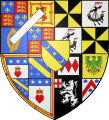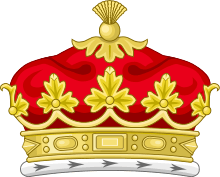Richard Scott, 10th Duke of Buccleuch
| His Grace The Duke of Buccleuch KBE DL FSA FRSE | |
|---|---|
|
Portrait by Allan Warren in 2013 | |
| Personal details | |
| Born |
Richard Walter John Montagu Douglas Scott 14 February 1954 Edinburgh, Scotland[1] |
| Spouse(s) | Lady Elizabeth Kerr (m. 1981) |
| Children | 4 |
| Parents |
John Scott, 9th Duke Jane McNeill |
| Education | Eton College |
| Alma mater | Christ Church, Oxford |
Richard Walter John Montagu Douglas Scott, 10th Duke of Buccleuch and 12th Duke of Queensberry, KBE DL FSA FRSE (born 14 February 1954), styled as Lord Eskdaill until 1973 and as Earl of Dalkeith from 1973 until 2007, is a Scottish landholder and peer. He is the Duke of Buccleuch and Queensberry, as well as Chief of Clan Scott. He is the senior patrilineal descendant of James, Duke of Monmouth (9 April 1649 – 15 July 1685), the eldest illegitimate son of King Charles II and his mistress, Lucy Walter.
In 2013, The Herald reported that the Duke was Scotland's largest private landowner, with some 280,000 acres (110,000 ha).[2]
Early life and education
Scott was born in 1954, the son of John, Earl of Dalkeith (later 9th Duke of Buccleuch), and his wife, Jane McNeill. He was baptised with Princess Margaret as one of his godparents.
He was educated at St. Mary's School, Melrose, Eton College, and was Page of Honour to Queen Elizabeth The Queen Mother from 1967 to 1969.[3][4] In 1973, his father inherited the Dukedoms of Buccleuch and Queensberry, and Scott took the courtesy title Earl of Dalkeith, prior to that he was styled as Lord Eskdaill. He graduated from the University of Oxford in 1976 as a Bachelor of Arts.
Marriage and family
In 1981, he married Lady Elizabeth Marian Frances Kerr, a daughter of the 12th Marquess of Lothian (and a sister of the 13th Marquess of Lothian, a Conservative politician), and they had four children:
- Lady Louisa Jane Therese Montagu Douglas Scott (1 October 1982) she married Rupert Trotter on 28 May 2011. They have two children:
- Molly Elizabeth Jane Trotter (20 August 2012)
- Robin Peter Trotter (21 May 2014)
- Walter John Francis Montagu Douglas Scott, Earl of Dalkeith (2 August 1984) he married Elizabeth Hanar Cobbe on 22 November 2014.
- Lord Charles David Peter Montagu Douglas Scott (b. 20 April 1987)
- Lady Amabel Clare Alice Montagu Douglas Scott (b. 23 June 1992)
The Duchess of Buccleuch and Queensberry is a patroness of the Royal Caledonian Ball.[5]
Career
As Earl of Dalkeith, he had a brief term on the board of Border Television from 1989 to 1990, and in 1994 he joined the Millennium Commission as the representative for Northern England. He was awarded a KBE in the 2000 New Year Honours for his services to the Millennium Celebrations,[6] leaving the commission in 2003. He was president of the National Trust for Scotland from 2003 to 2012, and is a Fellow of the Royal Society of Edinburgh.
He also served as Deputy Chairman of the (since abolished) Independent Television Commission, as a member of Scottish Heritage, on the board of the Winston Churchill Memorial Trust, and was President of the Royal Scottish Geographical Society from 1999 to 2005.
He inherited the titles of Duke of Buccleuch and Duke of Queensberry upon his father's death on 4 September 2007.
The art collection of the Dukes of Buccleuch is of great significance, and the recovery of the stolen Leonardo da Vinci painting Madonna of the Yarnwinder from the collection, valued at 30 million GBP, in a raid on the offices of a prestigious law firm captured public attention in 2007.[7] A discovery in 2008 of a painting in the family collection at Boughton House, a rare portrait of the young Queen Elizabeth I of England, was welcomed by art historians.[8]
On 1 January 2011, he was appointed Honorary Colonel of the 6th Battalion, The Royal Regiment of Scotland.[9] In late 2011, he was appointed Deputy Lieutenant of Roxburgh, Ettrick & Lauderdale.[10]
The Duke is a trustee of the Royal Collection Trust,[11] President of the Georgian Group and an Honorary Member of the Royal Institution of Chartered Surveyors (HonRICS).
In October 2016, the Duke was appointed High Steward of Westminster Abbey, a position previously held by the 5th Duke in the late 19th century.[12]
Houses owned by the Duke include Boughton House, Drumlanrig Castle, Dalkeith Palace, and Bowhill House.
Ancestry
The paternity of James, Duke of Monmouth has long been in dispute. In 2012, a DNA test conducted on the present Duke of Buccleuch showed that he shared the same Y chromosome (inherited from father-to-son) as a distant Stuart cousin, providing strong evidence that Charles II was indeed Monmouth's biological father.[13]
| Ancestors of Richard Scott, 10th Duke of Buccleuch | ||||||||||||||||||||||||||||||||||||||||||||||||||||||||||||||||||||||||||||||||||||||||||||||||||||||||||||||||||||||||||||||||||||||||||||||||||||||||||||||||||||||||||||||||||||||||||||||||||||||||||||||||||||||||||||||||||||||||||||||||||||||||||||||||||||||||||||||||||||||||||||||||||||||||||||||||||||||||||||||||||||||||||||||||||||||||||||||||||||||||||||||||||||||||||||||||||||||||||||||||||||||||||||||||||||||||||||||||||||||||||||||||||||||||||||||||||||||||||||||||||||||||||||||||||||||||||||||||||
|---|---|---|---|---|---|---|---|---|---|---|---|---|---|---|---|---|---|---|---|---|---|---|---|---|---|---|---|---|---|---|---|---|---|---|---|---|---|---|---|---|---|---|---|---|---|---|---|---|---|---|---|---|---|---|---|---|---|---|---|---|---|---|---|---|---|---|---|---|---|---|---|---|---|---|---|---|---|---|---|---|---|---|---|---|---|---|---|---|---|---|---|---|---|---|---|---|---|---|---|---|---|---|---|---|---|---|---|---|---|---|---|---|---|---|---|---|---|---|---|---|---|---|---|---|---|---|---|---|---|---|---|---|---|---|---|---|---|---|---|---|---|---|---|---|---|---|---|---|---|---|---|---|---|---|---|---|---|---|---|---|---|---|---|---|---|---|---|---|---|---|---|---|---|---|---|---|---|---|---|---|---|---|---|---|---|---|---|---|---|---|---|---|---|---|---|---|---|---|---|---|---|---|---|---|---|---|---|---|---|---|---|---|---|---|---|---|---|---|---|---|---|---|---|---|---|---|---|---|---|---|---|---|---|---|---|---|---|---|---|---|---|---|---|---|---|---|---|---|---|---|---|---|---|---|---|---|---|---|---|---|---|---|---|---|---|---|---|---|---|---|---|---|---|---|---|---|---|---|---|---|---|---|---|---|---|---|---|---|---|---|---|---|---|---|---|---|---|---|---|---|---|---|---|---|---|---|---|---|---|---|---|---|---|---|---|---|---|---|---|---|---|---|---|---|---|---|---|---|---|---|---|---|---|---|---|---|---|---|---|---|---|---|---|---|---|---|---|---|---|---|---|---|---|---|---|---|---|---|---|---|---|---|---|---|---|---|---|---|---|---|---|---|---|---|---|---|---|---|---|---|---|---|---|---|---|---|---|---|---|---|---|---|---|---|---|---|---|---|---|---|---|---|---|---|---|---|---|---|---|---|---|---|---|---|---|---|---|---|---|---|---|---|---|---|---|---|---|---|---|---|---|---|---|---|---|---|---|---|---|---|---|---|---|---|---|---|---|---|---|---|---|---|---|---|---|---|---|---|---|---|---|---|---|---|---|---|---|---|---|---|---|---|---|---|---|---|---|---|---|---|---|---|---|---|---|---|---|---|---|---|---|---|---|---|---|---|---|---|---|---|---|---|---|---|---|---|---|---|---|---|---|---|---|---|
| ||||||||||||||||||||||||||||||||||||||||||||||||||||||||||||||||||||||||||||||||||||||||||||||||||||||||||||||||||||||||||||||||||||||||||||||||||||||||||||||||||||||||||||||||||||||||||||||||||||||||||||||||||||||||||||||||||||||||||||||||||||||||||||||||||||||||||||||||||||||||||||||||||||||||||||||||||||||||||||||||||||||||||||||||||||||||||||||||||||||||||||||||||||||||||||||||||||||||||||||||||||||||||||||||||||||||||||||||||||||||||||||||||||||||||||||||||||||||||||||||||||||||||||||||||||||||||||||||||
Arms
 |
|
References
- ↑ "Heir for Earl of Dalkeith". The Times. The Times Digital Archive. 15 February 1954. p. 8.
- ↑ Ross, David (5 June 2013). "Questions raised over land swap deal with billionaire". The Herald. Retrieved 12 January 2015.
- ↑ The London Gazette: no. 44471. p. 13447. 8 December 1967. Retrieved 30 September 2015.
- ↑ The London Gazette: no. 44968. p. 11119. 20 November 1969. Retrieved 30 September 2015.
- ↑ "Patronesses". Royal Caledonian Ball.
- ↑ The London Gazette: (Supplement) no. 55710. p. 8. 31 December 1999. Retrieved 22 October 2015.
- ↑ Campsie, Alison. Return of da Vinci had more twists than a Hollywood film, Herald Scotland, April 22, 2010. Accessed April 21, 2014.
- ↑ "Rare Elizabeth I portrait found". BBC News. 27 May 2008. Retrieved 21 October 2015.
- ↑ The London Gazette: (Supplement) no. 59692. p. 2146. 8 February 2011. Retrieved 22 October 2015.
- ↑ The London Gazette: no. 59982. p. 23015. 1 December 2011. Retrieved 22 October 2015.
- ↑ "Home". royalcollection.org.uk. Retrieved 21 November 2016.
- ↑ "Duke of Buccleuch appointed as High Steward of Westminster Abbey". westminster-abbey.org. Retrieved 21 November 2016.
- ↑ "Scotland's DNA: Descended from lost tribes…and related to Napoleon". The Scotsman. 17 April 2012. Retrieved 20 April 2012.
External links
- Official Buccleuch Group of companies website
- Princess Elizabeth I portrait found
- Madonna back to Buccleuch
| Court offices | ||
|---|---|---|
| Preceded by Valentine Cecil |
Page of Honour to The Queen Mother 1967 – 1969 |
Succeeded by Simon Mulholland |
| Peerage of Scotland | ||
| Preceded by Walter Scott |
Duke of Buccleuch Duke of Queensberry 2007 – present |
Incumbent |
| Orders of precedence in the United Kingdom | ||
| Preceded by The Duke of Hamilton |
Gentlemen | Succeeded by The Duke of Argyll |
